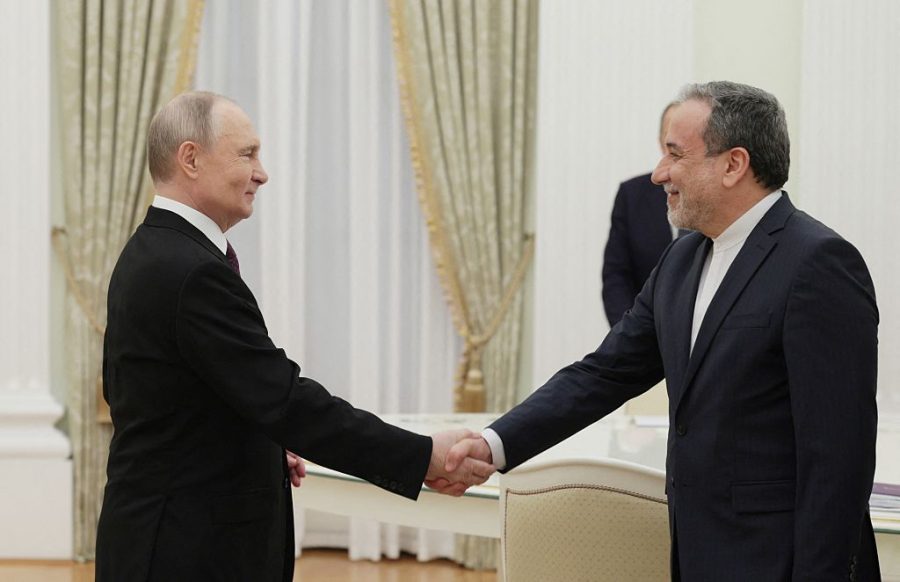Is Donald Trump’s decision to join attacks on Iran’s nuclear facilities an embarrassment, a provocation or an opportunity for Russia? The honest answer is that it is all three, but likely more of an opportunity than anything else, if Moscow is willing to play it cool.
Iranian Foreign Minister Abbas Araghchi is in Moscow today to meet with Vladimir Putin, and before he set out, he was trying to sound bullish, asserting that ‘Russia is a friend of Iran’, and that he expected concrete measures in support. Yet one can question how far the two countries were ever truly allies, so much as frenemies who shared a series of common problems and antagonists.
The truth is that there is very little Moscow can do beyond gesture politics,
Iranian assistance in the early years of the Russian invasion of Ukraine was crucial in closing a dangerous gap in Russian production of drones and missiles. But this was not aid, like the support provided to Kyiv by the West, but trade. Russia had to pay for what it got, and not just monetarily. After the 7 October 2023 attacks into Israel by Hamas, Moscow was in effect forced to abandon its previous efforts to maintain a balance between Tel Aviv and Tehran and side with Iran’s clients.
Moscow is an active participant in Tehran’s civilian nuclear programme, which inevitably fed through to its military one, but it never wanted to see a nuclear-armed Iran. Furthermore, the two countries, while sharing know-how on sanctions-busting and other dark arts of their struggle against the Western world order, were also geopolitical competitors in the Middle East and even Central Asia and the South Caucasus, once considered Moscow’s backyard.
Hence the complexity of Moscow’s response to the current crisis. It is undoubtedly an embarrassment to see Russian-supplied air defences swept aside so easily (even if they were not the latest systems) and not just the US but also Israel assert the kind of air dominance that they were never able to impose over Ukraine.
It is also considered by some in Moscow to be a provocation, not so much because they care about Iran, but because as the Israelis and now even Donald Trump talk about this in terms not simply of a pre-emptive response to a nuclear threat but a campaign for regime change, this hits a particularly sore spot for them. Putin and his hawkish cronies have long believed that the US has been behind a long-term campaign of ‘hybrid war’ projects to topple regimes to which it is opposed – many of which were also Russian allies – from Iraq and Libya to the Arab Spring risings and the Colour Revolutions of post-Soviet Eurasia. Indeed, Putin directly portrayed the 2011-13 Bolotnaya protests in Russia and the 2014 Revolution of Dignity in Ukraine as such regime change campaigns.
There is a sense that it becomes harder for Moscow to confine itself to the usual platitudes about the need for restraint and the dangers of escalation in this context. So far, though, it is doing its best.
There have been fiery words from the usual sources. Former president Dmitri Medvedev caught the headlines by suggesting that ‘a number of countries are ready to directly supply Iran with their nuclear arsenal’. These commentators’ role is precisely to produce a toxic smokescreen, behind which the real movers and shakers can get away with caution. The Foreign Ministry, for example, has simply condemned the US attacks with a warning that ‘a dangerous escalation is underway, one that threatens to further destabilise security both in the region and globally.’
The truth is that there is very little Moscow can do beyond gesture politics, especially given that it was caught by surprise by Trump’s decision. It is neither able nor willing to project meaningful force in support of Tehran. Even sending the latest S-500 air defence systems would both diminish Russia’s own defences against Ukrainian attacks and take too long to bring into operation. Although Russia and Iran signed a strategic partnership this year, it includes no obligation of mutual military assistance.
This is why the war is also an opportunity for Moscow. With its defence-industrial complex now working at full tilt, it is no longer dependent on Iran, and can afford to think much more sharply about its own interests. There is little real loss in prestige, as no one seriously imagined Putin could do anything to shield Iran, and the potential that the West will have to become increasingly committed to a long-term crisis in the Middle East is growing. As one nationalist Russian commentator on social media chortled, ‘every extra air defence missile for Israel is one less for Ukraine.’
In the global south, the US can be portrayed as a thuggish pawn of Zionist interests and an untrustworthy interlocutor. Sceptical audiences in Europe can be regaled with warnings that they risk being sucked into Trump and Netanyahu’s war. More generally, for all that there is obviously no real comparison between Kyiv and Tehran, the Russians will claim that they, too, were simply making a pre-emptive attack in Ukraine to protect their own security. However ridiculous the parallel may sound, there will be some who buy it.
More practically, turmoil in the Middle East pushes up oil prices, and that restocks Putin’s war chest. It gives Moscow more credibility with other Arab states, which are so important to it both for managing oil prices and also as gateways through which to launder money and bypass sanctions. And although Trump rejected Putin’s initial offer of mediation, for the Russians it raises the delicious vision of their being able to step in at some point and be the peacemakers and do Washington a favour on which they can collect. It’s an ill wind.








Comments